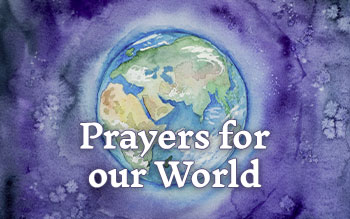Displaying items by tag: peace talks
Ukraine: new peace talks, says Zelensky
Volodymyr Zelensky has announced that Ukraine and Russia will engage in another round of talks on 23 July in Turkey. This comes at a time of intensified Russian drone attacks and continued escalation in the long-running conflict, now in its fourth year. While earlier talks have led to prisoner exchanges, little progress has been made toward achieving a lasting peace. Russia’s conditions for ending the war include Ukraine’s full withdrawal from the regions of the country now occupied by Russia, and international recognition of territories it has claimed since 2014, including Crimea. Ukraine, on the other hand, seeks a ceasefire, restoration of its borders (to 2013), return of all abducted children, release of civilians, and the exchange of prisoners of war. Donald Trump has voiced support for increased sanctions on Russia to pressure a resolution, urging both sides to reach an agreement swiftly. The world watches closely as diplomatic efforts resume amid deep divisions and ongoing violence.
Ukraine / Russia: delegations arrive in Istanbul, but not Putin
Peace efforts between Russia and Ukraine took a cautious step forward as Russian delegates arrived in Istanbul on 15 May for proposed negotiations. Volodymyr Zelensky had invited Vladimir Putin to meet in person, but Putin declined, appointing aide Vladimir Medinsky to lead Russia’s delegation. The absence of top Russian officials, including foreign minister Sergey Lavrov, cast doubt on Moscow’s seriousness. Ukraine, emphasising the need for high-level talks, questioned the format and substance of the meeting. Zelensky said he would decide Ukraine’s response after seeing Russia’s true intentions. Ukraine and its allies had urged an unconditional ceasefire from 12 May, a proposal Moscow ignored. Donald Trump, who at one stage expressed interest in attending, will not participate, though Marco Rubio, Steve Witkoff, and NATO secretary Mark Rutte could do so. The situation remains fluid, with uncertainty surrounding whether the talks will lead to meaningful de-escalation or remain another missed opportunity.
Ukraine: Hegseth defends Trump’s phone call to Putin
US secretary of state Pete Hegseth has defended Donald Trump’s push for peace talks on Russia’s war in Ukraine, insisting it was not a betrayal of Kyiv. Speaking before a NATO meeting in Brussels, Hegseth emphasised the need for a negotiated peace but called Ukraine’s demands - restoring pre-2014 borders and NATO membership - ‘unrealistic’. Trump later confirmed he had spoken with Vladimir Putin, agreeing to initiate negotiations without prioritising territorial concerns or Ukraine’s NATO bid. European leaders voiced concern, fearing premature concessions could embolden Russia. Hegseth asked NATO allies to ramp up defence spending to 5%, a target the US itself does not reach. Volodymyr Zelensky, after speaking with Trump, reiterated his commitment to securing peace while ensuring Ukraine’s security. Questions remain over whether Moscow will accept a deal that meets Kyiv’s conditions. Trump’s advisers are set to meet Zelensky at the Munich security conference to discuss next steps.
Gaza: dead hostages recovered, peace talks continue
The Israel Defence Forces (IDF) have recovered the bodies of six hostages from tunnels in Khan Younis, bringing heartbreaking confirmation to their families. Meanwhile, on 20 August at least twelve Palestinians were killed in an airstrike on a school: see Over 40,000 Palestinians have now died since the conflict began. As the situation escalates, US secretary of state Antony Blinken has been involved in ceasefire negotiations, warning that this may be the last opportunity to secure a hostage and prisoner swap. While a potential agreement appears close, with Benjamin Netanyahu reportedly accepting a US ‘bridging proposal’, there still appear to be large gaps between the two sides. On the central issue of the hostages, Hamas is demanding assurances that Israel will not begin military operations again after thirty of the most vulnerable are released. Israel is concerned that Hamas will drag out a second phase in which the remaining hostages, including male soldiers, are freed.
Sudan: USA urges both sides to new ceasefire talks, many millions facing acute hunger
The USA is launching new peace talks to end Sudan’s 16-month civil war, driven by fears that the conflict is plunging the country into potentially the worst famine in decades. Sudan’s military, one of the two warring factions, had originally agreed to attend the negotiations in Switzerland, but changed their minds after a drone attack on the army chief, dashing hopes for a quick ceasefire. The talks aim to broker a ceasefire and secure humanitarian access for over ten million displaced people. Famine has been declared in Sudan’s Darfur region, with estimates suggesting up to 2.5 million people could die of hunger by September. Only one-third of the $2.7 billion requested by the UN for Sudan has been received so far: the UN fears that as many as 26 million face acute hunger. See
South Sudan: peace talks face stumbling block
South Sudan's peace talks, which have been hosted by Kenya since May, were nearing completion, but are facing a setback due to opposition demands to revoke a bill permitting detention without warrants. The talks - dubbed Tumaini, Swahili for hope - have resulted in a draft agreement proposing to extend the country's transitional period and postpone the coming election (due on 22 December) to allow finishing up the country's constitution and electoral laws. However, opposition leader Pagan Amum Okiech has refused to sign an agreement unless the proposed National Security Act is repealed. He says, ‘This law violates the fundamental rights and freedoms of South Sudanese citizens; it eliminates civic and political space. There can be no peace or democracy under such a law.’ Human Rights Watch has called on President Kiir to reject the bill, warning it undermines human rights and democratic progress.
Philippines: peace talks falter as conflict continues
Efforts to restart peace talks between the Philippine government and the communist New People’s Army have faltered as clashes continue. President Ferdinand Marcos Jr surprised many when he initiated talks, facilitated by the Norwegian government, with the National Democratic Front (NDF), the rebels’ political front. These resulted in an agreement in which both parties acknowledged the underlying grievances at the heart of the conflict and agreed to seek reforms. However, military operations persist, including airstrikes in December in Mindanao which killed nine alleged rebels. The conflict, spanning more than fifty years, has claimed more than 40,000 lives, peaking during the martial law era of Ferdinand Marcos Sr. Peace talks have repeatedly collapsed over the years.
Yemen: peace talks
An agreement to restore relations between Saudi Arabia and Iran has opened the possibility of peace talks between Riyadh, which backs Yemen’s official rulers, and the Iran-aligned Houthi rebels. Saudi and Houthi representatives met with Omani mediators in Yemen last week to negotiate a permanent ceasefire. Pray for further progress. The UN estimates that 4.5 million Yemenis are displaced and two-thirds of the population are in dire need of humanitarian aid. In eight years Yemen has endured terrible suffering from bombs and mines causing needless deaths. The war is fuelled by Saudi Arabia, Britain, America and the United Arab Emirates - and also Iran, which has supplied funds and weapons to Houthi rebels. There are miles of negotiations and diplomatic manoeuvrings to go, but to reach this point is a tremendous tonic for Yemenis who have seen war plunge their beautiful and naturally resource-rich country into one of the world’s worst humanitarian crises.
Yemen: Houthis refuse cease-fire
Days after the UN called for a halt to fighting in Yemen amid the coronavirus pandemic, a two-week ceasefire was declared by the Saudi-UAE coalition. But the Houthis said they would keep fighting unless a years-long siege on the impoverished nation is lifted. The conflict has killed over 100,000 people and pushed millions to the verge of famine. The vulnerable impoverished people now have their first coronavirus case, and the country is now bracing itself for the pandemic. Continue to pray for a de-escalation in the fighting, widely seen as a proxy war between Saudi Arabia and Iran, and for the Houthis to join the UN-sponsored talks for a settlement to the five-year conflict. Pray particularly for God to soften the heart of Mohammed al-Bukhaiti, the Houthi spokesman.
Afghanistan and Taliban begin direct prisoner swap talks
Afghanistan has begun its first face-to-face talks with the Taliban on exchanging thousands of prisoners.
Details of the initial meeting in Kabul emerged on Wednesday 1 April, ahead of a planned second day of talks, as Afghans observed tight restrictions on movement because of the coronavirus pandemic.
Under a US-Taliban deal, the government will free 5,000 Taliban prisoners, while the militants will release 1,000.
The talks took place against a backdrop of continuing violence in the country. Authorities blamed the Taliban for an explosion in the southern province of Helmand on Wednesday that killed eight civilians, including several children.
How much progress has been made in talks?
The prisoner swap had been due to take place in early March, as part of a US-Taliban deal signed on 29 February, but there have been a series of setbacks. Until Wednesday, the two sides had only met by video conference.
With talks due to resume for a second day on Wednesday, Afghanistan's Office of the National Security Council said that progress had only been made so far "on technical matters". The talks were overseen by the International Committee of the Red Cross (ICRC) and the focus was on the release of security force and national defence captives as well as Taliban prisoners, the ICRC said.
Taliban spokesman Zabihullah Mujahid said the meetings did not amount to negotiations, telling AFP: "There will be no political talks there". The US Secretary of State, Mike Pompeo called the beginning of the talks "good news".
The Taliban had been due to send a large team to the Kabul talks, but in the end sent a three-man delegation because of the covid-19 virus outbreak. A spokesman for the militant group said the trio would monitor the prisoner release process and take the necessary technical measures.
Though US troops began withdrawing last month under the terms of the deal with the Taliban, movement on the prisoner swap has been slow because of disagreements between President Ashraf Ghani and his main political rival Abdullah Abdullah.
More at: https://www.bbc.co.uk/news/world-asia-52123951
Pray that these breakthrough talks will lead to a successful exchange of prisoners and that the face to face talks between the government will continue.
Pray for an end to the ongoing violence that is devastating the lives of many Afghans.
Pray that the coronavirus will be arrested in its tracks and that it will not spread.









